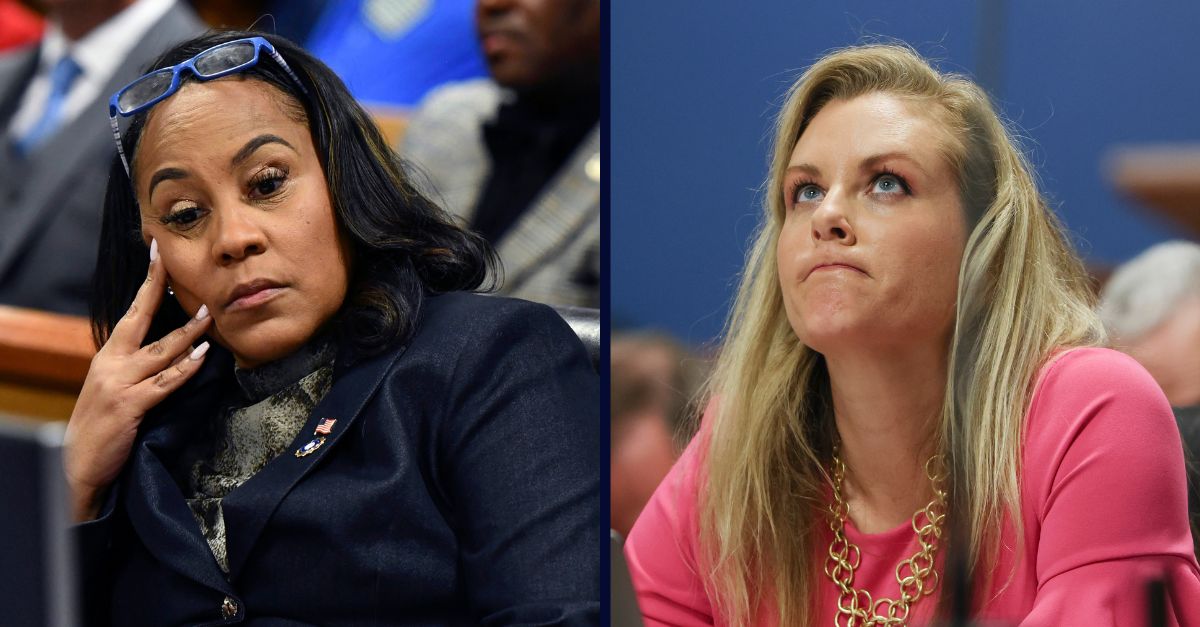
Left: FILE – Fulton County District Attorney Fani Willis appears during a hearing regarding defendant Harrison Floyd, a leader in the organization Black Voices for Trump, as part of the Georgia election indictments, Nov. 21, 2023, in Atlanta (Dennis Byron/Hip Hop Enquirer via AP, File). Right: Ashleigh Merchant, attorney for Michael Roman, pauses during a hearing in the case of State of Georgia v. Donald John Trump at the Fulton County Courthouse in Atlanta, Feb. 12, 2024. (Alyssa Pointer/Pool Photo via AP).
A Thursday morning hearing in a lawsuit related to the Georgia election interference and racketeering (RICO) case against Donald Trump started off with a bang as the judge declined to find Fulton County District Attorney Fani Willis in contempt over her alleged violation of state open records laws. Later, the judge held open the possibility that Willis might be subject to a subpoena.
“Unless and until Ms. Willis is called to the stand and refuses or fails to appear, if ordered to do so, she’s not in contempt and so, that motion is premature,” Fulton County Superior Court Judge Rachel Krause said at the outset of the hearing.
In a lawsuit filed earlier this year, attorney Ashleigh Merchant, who represents co-defendant Michael Roman in the underlying RICO case, accused Willis and her office of violating the Georgia Open Records Act by failing to provide documents related to the employment and remuneration of Nathan Wade. Wade, of course, is the former special assistant district attorney forced to resign from the RICO prosecution due to his onetime romantic relationship with Willis.
A series of disputes have prolonged the litigation and resulted in numerous hearings about the sufficiency of both the public records act requests and the state’s responses to those requests.
In response to the lawsuit, the DA’s office first argued the wrong party was sued. And, the defendants said, in any event the relevant, requested records have already been supplied or don’t exist.
The heart of that dispute is that the lawsuit originally named the Fulton County District Attorney’s Office as the organizational defendant in violation of the open records law. Later, the plaintiffs sought to add Fulton County itself as a named defendant.
In its motion to dismiss, the DA’s office said the plaintiffs sued the wrong entity. In a separate motion to dismiss, the county writ large said it could not be added to the lawsuit because it is not the custodian of records for the DA’s office.
In June, Krause gave Merchant broad latitude to amend pleadings and add any additional and necessary parties to the lawsuit. The named defendants were later given the opportunity to respond.
Months passed and the plaintiffs still insist they are being stonewalled — setting up the stage for the contempt filing against Willis.
While the judge denied that headline-generating motion to hold the DA herself in contempt, the majority of Thursday’s hearing dealt with the extant issue of subpoenas filed against DA’s office employees.
Merchant wants those employees to discuss the nature of the efforts they personally took when tasked to look for a series of documents. Such documents allegedly do exist but have not yet been produced. The DA’s office, in turn, has filed motions to quash those subpoenas.
Merchant began by attacking the credibility and counting methods of the other side. She said the DA’s office claims the plaintiffs subpoenaed 12 total DA employees, and disputed that number.
“Not sure where they got that from,” Merchant said. “That’s wrong, we only subpoenaed six DA employees.”
The necessity of questioning those witnesses was highlighted in a Wednesday response received by the plaintiffs, Merchant said. That’s because one of the subpoenaed employees just filed a new responsive document — well after the DA’s office said that all of the relevant documents had been released.
“They did not produce all the responsive documents. That’s false,” Merchant said. “This is why we need to be able to question the witnesses. We have a right to do that.”
Krause appeared amenable to the plaintiff’s frustrations regarding the slow pace of document production but focused her questions on whether the original subpoenas were enough to compel witness testimony — as opposed to just producing documents.
Merchant said all of this had actually been addressed at an earlier hearing in which the plaintiff agreed to expedite matters — relying on the court’s suggestions and the DA’s assurances to move on.
In agreeing to expedite, the plaintiffs waived several key discovery rights and moved to subpoena the witnesses in question, Merchant said. But those witnesses have since allegedly evaded the service of process.
“The county — the defendants — agreed to an expedited hearing,” Merchant said. “So we did that in good faith believing — they said they were not going to file motions to quash … We asked that. We asked that on purpose. You cleared your calendar. You gave us dates that were available. We all talked about the dates. We all did that in good faith. Had we known at that point, had they told us: ‘Hey, what we’re really gonna do is agree to this date and then hide from your service so you can’t actually subpoena any of these witnesses, that’s what we’re gonna do,’ then why would we have agreed to that?”
Merchant went on to say they agreed to expedite matters because this is a case about documents they’ve been trying to get from records custodians for over 10 months.
The judge appeared open to this line of argument.
Later, Merchant essayed a short speech about the public’s right to know, by way of why Willis was requesting additional funds in one particular instance, but the judge said relevance was actually not part of the inquiry under Georgia’s public records laws.
“I don’t need to know why you think those documents are important,” Krause said. “What I need to know is: Does anybody dispute that those documents are public records that would be subject to the Open Records Act. I don’t think that there’s any dispute that there is.”
Merchant agreed — saying she only brought up relevance because the defendants brought the issue up in their motion to quash. The judge understood and the two came away more or less in agreement.
“I don’t think relevance is a relevant inquiry in an Open Records Act litigation,” Krause said.
While the judge sought to laser focus on the issue of asking the witnesses questions and whether the plaintiffs had met their burden to do that, Merchant brought up the underlying issues again by alleging that forfeiture funds were used to pay Nathan Wade.
“It’s clear from the documents I got,” Merchant said.
The judge was not happy with this departure.
“Again, I don’t want to go down the road of what you believe these documents are relevant to, what use you plan to put them to,” Krause said — stressing the issue was still about questioning witnesses.
“I think you’ve met your burden for relevance to the public records request,” Krause said — suggesting the burden of questioning the requested witness was still an open matter.
As the defendants tried their hand at convincing Krause, they ran into similar territory by discussing motives and the underlying case.
Each time, the judge shut such arguments down quickly.
“The reason that a member of the public requests a document has nothing to do with anything,” Krause told an attorney representing the six nonparty DA’s office employees.
The defendants’ attorney, Andrea Alabi, later pushed back against the idea that the district attorney’s office was somehow trying to withhold information or otherwise was not acting aboveboard.
This earned a lengthy upbraiding from the court.
“I’m going to back us all up again, and I continue to do this, and I’m going to do it again, because both sides are doing it,” Krause said. “We’re here because a member of the public requested from a government agency documents about that government’s operation. So, the intention behind that request — the purpose that might be intended to use those documents — none of that, to my way of understanding how the Open Records Act is supposed to work, is relevant. What is relevant is the extent to which the government agency should gave those documents and should respond to those documents.”
Later, Sandy Monroe, representing Fulton County, also brought up the underlying RICO case — and again the judge lectured.
“Despite the subtext that all of y’all seem to be aware of and keep referring to — and I understand why it frustrates both sides — this is an Open Records Act, an Open Records Act action, it’s an action to enforce a request for open records,” Krause said. “And that’s all it is. Now, what somebody might try to do with those records and what they’re being asked for, is not my concern.”
As the hearing dragged on into the late morning and early afternoon hours, the court seemed more and more open to enforcing subpoenas against at least some of the DA’s employees.
The judge also held open the possibility, though remote, that Willis might actually find herself in contempt — reframing the court’s earlier denial of the contempt motion as purely procedural.
“If I am presiding over a trial,” Krause said, “The lawyers will typically subpoena eight, nine, 10 witnesses, right? If they think they can get through that many in a day. And I would never ever hold a witness in contempt for failing to appear if nobody actually called them to the stand and then they weren’t there in compliance with the subpoena.”
The judge reiterated that, in her opinion, the motion to hold Willis in contempt “was premature.” Then the court went the other way — delivering something of a victory for the plaintiffs.
“By extension, I think the motion to quash, at this point, is moot,” Krause said. “Because nobody has actually called her to the stand. I’ve already said my belief — based on the case law — is the plaintiffs are going to have to make some showing why her testimony would be specifically relevant here. That doesn’t necessarily relieve her from the obligation to potentially be subject to the subpoena. To be under subpoena.”
The next order of business, the judge suggested, would be to hear from other witnesses and then allow the plaintiffs to make the case for why Willis, herself, needed to testify about the open records requests. The court explicitly said the bar here was high.
“The motion to quash is not something that I’m going to entertain right now,” Krause said. “I’m not going to relieve Madame DA Willis of the possibility of having to testify in terms of being under subpoena for this proceeding.”
The judge said, however, that in evidentiary and court management terms, there were any number of reasons Willis might not be called to testify, reserving the authority to issue a final ruling in the future.
“To me, all of those matters, as I started with this morning, I think, are premature at this point,” Krause said.
Have a tip we should know? [email protected]







